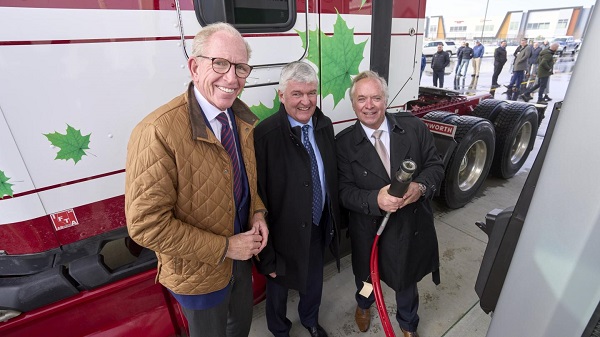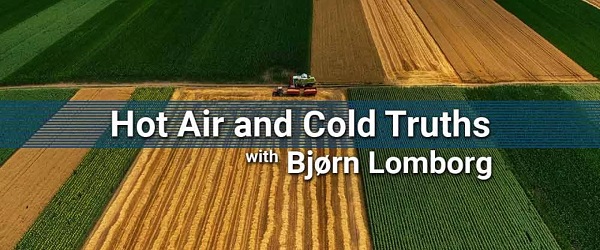Alberta
Heavy-duty truckers welcome new ‘natural gas highway’ in Alberta

Clean Energy Fuels CEO Andrew Littlefair, Tourmaline CEO Mike Rose, and Mullen Group chairman Murray Mullen attend the opening of a new Clean Energy/Tourmaline compressed natural gas (CNG) fuelling station in Calgary on Oct. 22, 2024. Photo courtesy Tourmaline
From the Canadian Energy Centre
New compressed natural gas fueling stations in Grande Prairie and Calgary join new stop in Edmonton
Heavy-duty truckers hauling everything from restaurant supplies to specialized oilfield services along one of Western Canada’s busiest corridors now have more access to a fuel that can help reduce emissions and save costs.
Two new fuelling stations serving compressed natural gas (CNG) rather than diesel in Grande Prairie and Calgary, along with a stop that opened in Edmonton last year, create the first phase of what proponents call a “natural gas highway”.
“Compressed natural gas is viable, it’s competitive and it’s good for the environment,” said Murray Mullen, chair of Mullen Group, which operates more than 4,300 trucks and thousands of pieces of equipment supporting Western Canada’s energy industry.
Right now, the company is running 19 CNG units and plans to deploy another 15 as they become available.
“They’re running the highways right now and they’re performing exceptionally well,” Mullen said on Oct. 22 during the ribbon-cutting ceremony opening the new station on the northern edge of Calgary along Highway 2.
“Our people love them, our customers love them and I think it’s going to be the way for the future to be honest,” he said.
 Heavy-duty trucks at Tourmaline and Clean Energy’s new Calgary compressed natural gas fuelling station. Photo courtesy Tourmaline
Heavy-duty trucks at Tourmaline and Clean Energy’s new Calgary compressed natural gas fuelling station. Photo courtesy Tourmaline
According to Natural Resources Canada, natural gas burns more cleanly than gasoline or diesel fuel, producing fewer toxic pollutants and greenhouse gas emissions that contribute to climate change.
The two new CNG stops are part of a $70 million partnership announced last year between major Canadian natural gas producer Tourmaline and California-based Clean Energy Fuels.
Their deal would see up to 20 new CNG stations built in Western Canada over the next five years, daily filling up to 3,000 natural gas-fueled trucks.
One of North America’s biggest trucking suppliers to businesses including McDonald’s, Pizza Hut, Subway and Popeye’s says the new stations will help as it expands its fleet of CNG-powered vehicles across Canada.
Amy Senter, global vice-president of sustainability with Illinois-based Martin Brower, said in a statement that using more CNG is critical to the company achieving its emissions reduction targets.
For Tourmaline, delivering CNG to heavy-duty truckers builds on its multi-year program to displace diesel in its operations, primarily by switching drilling equipment to run on natural gas.
Between 2018 and 2022, the company displaced the equivalent of 36 Olympic-sized swimming pools worth of diesel that didn’t get used, or the equivalent emissions of about 58,000 passenger vehicles.
 Tourmaline CEO Mike Rose speaks to reporters during the opening of a new Tourmaline/Clean Energy compressed natural gas fuelling station in Calgary on Oct. 22, 2024. Photo courtesy Tourmaline
Tourmaline CEO Mike Rose speaks to reporters during the opening of a new Tourmaline/Clean Energy compressed natural gas fuelling station in Calgary on Oct. 22, 2024. Photo courtesy Tourmaline
Tourmaline CEO Mike Rose noted that the trucking sector switching fuel from diesel to natural gas is gaining momentum, notably in Asia.
A “small but growing” share of China’s trucking fleet moving to natural gas helped drive an 11 percent reduction in overall diesel consumption this June compared to the previous year, according to the latest data from the U.S. Energy Information Administration.
“China’s talking about 30 percent of the trucks sold going forward are to be CNG trucks, and it’s all about reducing emissions,” Rose said.
“It’s one global atmosphere. We’re going to reduce them here; they’re going to reduce them there and everybody’s a net winner.”
Switching from diesel to CNG is “extremely cost competitive” for trucking fleets, said Clean Energy CEO Andrew Littlefair.
“It will really move the big rigs that we need in Western Canada for the long distance and heavy loads,” he said.
Tourmaline and Clean Energy aim to have seven CNG fuelling stations operating by the end of 2025. Construction is set to begin in Kamloops, B.C., followed by Fort McMurray and Fort St. John.
“You’ll have that Western Canadian corridor, and then we’ll grow it from there,” Littlefair said.
Alberta
Province pumping $100 million into Collegiates and Dual-Credit hands-on learning programs

Alberta’s government is helping students discover their skills and interests today, to help them find careers for tomorrow.
If passed, Budget 2025 will provide more than $100 million over three years for school boards to grow career education programs, including funding for more collegiate and dual-credit programs across Alberta.
“We are working to set students up for success by strengthening job-focused education. This money is helping schools partner with businesses, universities and colleges to create programs that will help students hit the ground running after they graduate.”
Career education helps students gain credits towards graduation while earning hands-on experience in fields like the trades, computer programming, health care, agriculture, culinary arts and more. These career education programs support a strong economy by helping students learn the skills they need to get in-demand jobs.
Collegiate schools
Collegiate schools work with businesses, universities and colleges to offer classes that give students pathways to education and careers in the job of their choice. There are 12 collegiate schools in Alberta, offering many different types of programming for grades 7-12, including aviation, graphic design, trades and more.
If passed, Budget 2025 provides more than $21 million to school boards to help fund special classrooms like carpentry workshops, film and media rooms, science laboratories, heavy equipment simulators and aircraft hangars. Another $6 million is being invested to support the start-up costs for new collegiate schools.
Dual-credit programs
Budget 2025, if passed, also provides $4.6 million in 2025/26 to start new or improve existing dual-credit programs. In partnership with universities and colleges, dual-credit programs give students a head start on rewarding careers by allowing them to earn high-school and post-secondary credits at the same time. Of the $4.6 million, $550,000 is being provided by Alberta Seniors, Community and Social Services for new and improved dual-credit health care aide programs.
“Health care aides play a critical role in ensuring Albertans receive the continuing care services they need to maintain their health, independence and quality of life. Our investments into career pathways for health care aides will provide opportunities for young Albertans to develop the skills they need to build a rewarding career in Alberta’s continuing care workforce.”
Another $1.4 million is being invested to support students participating in off-campus career education programs through CAREERS. This non-profit connects students to jobs in high-demand fields, such as the trades, technology, health, forestry and agriculture.
“Investments in collegiate and dual-credit programming are significant for Calgary Catholic as they further strengthen our collegiate and dual-credit programming. This programming will open opportunities for our students and help them to realize their full potential.”
“Before Fusion Collegiate, I felt lost and wasn’t really sure what to do after high school. Thanks to its career-focused learning and the opportunities through Fusion and The Educational Partnership Foundation, I’m now working as a first-year apprentice plumber with Mr. Rooter. The hands-on trades training, high school credits, safety certifications, and real-world skills I picked up completely changed my life. I’m excited about where my career is headed and really thankful for the support that helped me get here.”
Budget 2025 is meeting the challenge faced by Alberta communities with continued investments in education and health, lower taxes for families and a focus on the economy.
Quick facts
- If passed, Budget 2025 invests $102.4 million over three years to provide sustainable, predictable career education funding, and to increase access to career education for Alberta students.
- This includes $8.4 million over 2026-27 and 2027-28 to raise awareness among students and families of career education programs and pathways available to Alberta students.
- Career education in Alberta includes career and technology courses, Career and Life Management (CALM), dual-credit courses, collegiate schools, apprenticeships and off-campus education programming.
- Since 2013, more than 95,000 high school students participated in at least one dual–credit course.
- In spring 2025, Alberta Education will engage with education partners on best practices to bring more career education opportunities to students.
- Since 2022, education partners and almost 5,000 Albertans have provided their feedback on career education and workforce needs.
Related information
Alberta
Photo radar to be restricted to School, Playground, and Construction Zones as Alberta ends photo radar era

Alberta’s government is fulfilling its promise to end Automated Traffic Enforcement (ATE) in select locations while enhancing safety with a new Traffic Safety Fund.
For years, Alberta has had the most ATE sites of any jurisdiction in Canada with many serving as a “cash cow,” generating millions of dollars in revenue with no clear evidence they were improving traffic safety. Now, following thorough consultation and review of existing ATE sites, Alberta’s government is making significant changes to restore public trust in the use of photo radar.
Effective April 1, the updated ATE Technology Guideline will prohibit photo radar on numbered provincial highways and connectors, restricting it only to school, playground and construction zones. Intersection safety devices in Alberta will also be limited to red light enforcement only, ending the “speed-on-green” ticketing function.
“We have officially killed the photo radar cash cow and the revenue-generating “fishing holes” that made Alberta the biggest user of photo radar in Canada. The updated guideline will ensure that photo radar is used for safety only. The new provincial traffic safety fund will support municipalities in physical improvements at key intersections, helping to reduce traffic risks and enhance safe roads.”
Alberta’s government has also created a new $13-million Traffic Safety Fund for municipalities to upgrade local roads and intersections that pose demonstrated safety risks. Details will be made available on how to apply for the Traffic Safety Fund, once the application process has been finalized.
“This shift ensures that photo radar is used where it matters most – near schools, playgrounds and construction zones. Traffic enforcement should be about protecting people, not generating revenue. The new Traffic Safety Fund gives municipalities the tools to make targeted improvements to roads and intersections with real safety concerns. Keeping Edmontonians safe on our streets must always remain the priority.”
“Shifting photo radar to playgrounds and construction zones enhances safety where it matters most – protecting our children and workers on Calgary’s roads. I’m proud to back this important step toward safer communities.”
“The Traffic Safety Fund is a welcome addition to the overall funding available to municipalities. The Rural Municipalities of Alberta support a dynamic approach to managing traffic safety.”
Municipalities are encouraged to use traffic calming measures instead of photo radar but may request provincial approval for an exemption to the photo radar ban in high-collision locations. To do so, municipalities must submit a business case detailing high-collision frequency and severity at the site, relative to similar locations, and demonstrate how other safety measures are not possible or will be ineffective. To be approved for an exemption, they must also commit to audit the exempted site every two years to assess the effectiveness of photo radar in reducing collisions at that location.
The updated ATE Technology Guideline also includes parameters around equipment testing and maintenance, data collection and reporting requirements, traffic safety plans, signage and public communication of photo radar locations.
Quick facts
- On April 1, the new ATE 2025 Technology Guideline comes into force.
- The newly created Traffic Safety Fund will provide $13 million over three years to help municipalities re-engineer intersections to reduce collisions:
- $1 million in 2025-26
- $2 million in 2026-27
- $10 million in 2027-28
- Alberta first introduced photo radar in 1987.
Related information
-

 2025 Federal Election2 days ago
2025 Federal Election2 days agoPoilievre refuses to bash Trump via trick question, says it’s possible to work with him and be ‘firm’
-

 COVID-192 days ago
COVID-192 days ago17-year-old died after taking COVID shot, but Ontario judge denies his family’s liability claim
-

 Community2 days ago
Community2 days agoSupport local healthcare while winning amazing prizes!
-

 Alberta1 day ago
Alberta1 day agoAlberta Institute urging Premier Smith to follow Saskatchewan and drop Industrial Carbon Tax
-

 Business2 days ago
Business2 days agoWhile “Team Canada” attacks Trump for election points, Premier Danielle Smith advocates for future trade relations
-

 2025 Federal Election1 day ago
2025 Federal Election1 day agoFool Me Once: The Cost of Carney–Trudeau Tax Games
-

 Addictions1 day ago
Addictions1 day agoShould fentanyl dealers face manslaughter charges for fatal overdoses?
-

 Alberta23 hours ago
Alberta23 hours agoAlbertans have contributed $53.6 billion to the retirement of Canadians in other provinces





